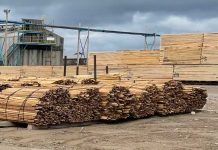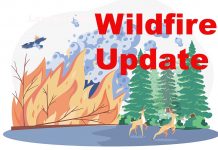
Coast Salish Traditional Territory/Vancouver – BC First Nations leaders are calling on the federal and provincial governments to provide immediate and on-going supports needed by the numerous BC First Nations directly impacted by the 2018 BC Wildfire Season and to also create a BC First Nations Emergency Management Fund, which was proposed following the 2017 BC wildfire season.
Regional Chief Terry Teegee and Grand Chief Ed John met with Premier Horgan, and Defence Minister Sajjan yesterday in Prince George to discuss ongoing efforts and situation affecting northern BC, and the rest of the province.
“Once again, BC finds itself under a State of Emergency due to the serious nature of the impacts from the more than 550 fires burning across the province. The crisis in wildfire management continues to emerge year after year and is a direct result of a number of factors including climate change, chronic underfunding for wildfire response, deficiencies in current and historical logging practices, and other mitigating factors. What we have learned over the past few years is that Canada must respond to this current climate change impact with mitigation and adaptation measures as called for in the Paris Climate Agreement, to which Canada is a signatory”, added Grand Chief Edward John of the First Nations Summit Political Executive.
“We can’t continue being held in ‘no man’s land’ between the two levels of government while they try to decide who will contribute first and how much. This has created a frustrating situation for impacted communities. Given the past few wildfire seasons, there should have been better preparation for the 2018 wildfire season to ensure communities don’t have to battle this political and bureaucratic nightmare. We must jointly take an assertive push to access the resources our communities need”, said Grand Chief Stewart Phillip, President of the Union of BC Indian Chiefs.
“First Nations in BC continue to be severely impacted by wildfires and we urgently request immediate and ongoing emergency management and financial support to ensure safety, security, and recovery within our communities. With BC’s First Nations spanning a spectrum of size, remoteness, governance, and capacity there remains an urgent requirement to provide the necessary assistance and coordination for these First Nations communities to work with each other and to collaborate with local/regional governments and with federal and provincial agencies”, concluded Regional Chief Terry Teegee of the BC Assembly of First Nations.
During and following the 2017 BC Wildfire season BC First Nations leaders submitted a proposal (attached) to Canada entitled “A Proposal for a BC First Nations Emergency Management Fund to prepare for, prevent, respond to and recover from emergencies (2017). The proposal is based on the experiences of First Nations communities responding to the crisis arising from massive forest fires throughout the province of BC in the summer of 2017. Many lessons were learned as First Nations were scrambling from the onset of the 2017 fire season to protect their members, homes, infrastructure and their communities.
Additionally, the BC Assembly of First Nations, First Nations Summit, and Union of BC Indians Chiefs have also sent letters to Prime Minister Trudeau and Premier Horgan urging Canada and BC to:
- Properly resource BC First Nations Communities to effectively and adequately respond to impacts of wildfires;
- Provide any and all information regarding what resources are currently being provided to BC First Nations as well as what contingency funds BC and Canada have in place for impacted First Nations for response and recovery;
- A request that new Provincial supports for housing and infrastructure recently announced should prioritize impacted First Nations, such as the Tahltan Nation and other directly affected communities;
- Urge BC and Canada to fully implement recommendations from “From the Ashes: Reimagining Fire Safety and Emergency Management in Indigenous Communities, June 2018 Report of the Standing Committee on Indigenous and Northern Affairs.”
There have been many gaps in emergency and disaster responses to First Nations needs and these need to be identified and plans developed to rectify these gaps. BC First Nations leaders are also requesting a meeting to discuss these critical issues with Prime Minister Justin Trudeau, who will be in Prince George tomorrow to assess the devastating impacts of the 2018 BC Wildfire season.
The First Nations Leadership Council is comprised of the political executives of the BC Assembly of First Nations, First Nations Summit, and the Union of BC Indian Chiefs.
Background
List of the seven recommended actions contained in “A Proposal for a BC First Nations Emergency Management Fund to prepare for, prevent, respond to and recover from emergencies (2017)”;
- Review and, as necessary, revise, the status and adequacy of all 203 First Nations’ emergency preparedness, evacuation and response plans and their full and effective operational implementation.
- Support for the development of comprehensive strategic and operational level engagement and implementation plans of all BC First Nations with provincial, federal, regional districts and municipalities, as well as with government agencies such as Emergency Management BC and Wildfire BC for effective and coordinated response capacities;
- Support all First Nations’ acquisition and ongoing maintenance of necessary assets including infrastructures, equipment and supplies to respond fully and effectively to emergency situations such as floods and forest fires;
- Support for capacity development, including training and accreditation, of First Nations peoples who are responsible to manage and respond to emergency situations. Where trained, these response teams should be brought into situations where their skill and expertise are required;
- Support for those evacuated or relocated and for recovery, restoration and/or rebuilding of lands, homes, infrastructure in First Nations communities, as well as support for those evacuees returning, bearing in mind their dignity, health and well-being. In addition, there will need to be support and resources for the many communities, including First Nations communities, who opened their doors and welcomed all those who needed refuge and a safe haven.
- In 2017, Tl’etinqox village at Anaham served as a central gathering point for many on the Tsilhqot’in highway and should be supported as a response centre for Tsilhqot’in, southern Carrier and other communities.
- There have been and will continue to be broader impacts, such as loss of traditional food security due to inaccessibility of traditional food sources including fish, loss of hay and grazing land for livestock, and loss of cultural heritage, among many. Those who have lost livestock and other means of livelihood or food security should be supported in their renewed efforts for re-development.






